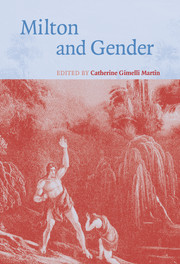Book contents
- Frontmatter
- Contents
- List of illustrations
- Notes on contributors
- Acknowledgments
- Abbreviations
- Introduction: Milton's gendered subjects
- PART I MASCULINITY, DIVORCE, AND MISOGYNY IN MILTON'S PROSE
- 1 The gender of civic virtue
- 2 The aesthetics of divorce: “masculinism,” idolatry, and poetic authority in Tetrachordon and Paradise Lost
- 3 Dalila, misogyny, and Milton's Christian liberty of divorce
- PART II THE GENDERED SUBJECTS OF MILTON'S MAJOR POEMS
- PART III GENDERED SUBJECTIVITY IN MILTON'S LITERARY HISTORY
- Index
3 - Dalila, misogyny, and Milton's Christian liberty of divorce
Published online by Cambridge University Press: 22 September 2009
- Frontmatter
- Contents
- List of illustrations
- Notes on contributors
- Acknowledgments
- Abbreviations
- Introduction: Milton's gendered subjects
- PART I MASCULINITY, DIVORCE, AND MISOGYNY IN MILTON'S PROSE
- 1 The gender of civic virtue
- 2 The aesthetics of divorce: “masculinism,” idolatry, and poetic authority in Tetrachordon and Paradise Lost
- 3 Dalila, misogyny, and Milton's Christian liberty of divorce
- PART II THE GENDERED SUBJECTS OF MILTON'S MAJOR POEMS
- PART III GENDERED SUBJECTIVITY IN MILTON'S LITERARY HISTORY
- Index
Summary
Milton, the guardian and hierophant of sacred mysteries, [is] inalterably opposed to the “idleness and unmanly despair” of the false, effeminate creation … however … the image of the Miltonic father being ministered to hints that his powers are not quite absolute, that in fact he has been reduced to a state of dependence upon his female [literary] descendents [sic]. Blinded, needing tea and sympathy as well as secretarial help, the godlike bard loses at least some of his divinity and is humanized, even (to coin a term) Samsonized.
–Sandra M. Gilbert and Susan Gubar, The Madwoman in the AtticAlthough not specifically concerned with Milton's tragic drama, Gilbert and Gubar's The Madwoman in the Attic clearly implies that Milton's misogynistic hatred of all “effeminate creation” receives its final expression in Samson's “crushing” revenge upon Dalila and the full flower of her effeminate people. In return, his literary daughters are licensed to “Samsonize” the godlike bard lest they fall victim to his “bogey,” the hierophant who makes women “at best a serviceable second” to masculine creation by associating the feminine principle with the satanic principle. From that perspective, the real hero of Samson Agonistes is Dalila, whose wrongs should be righted by critical daughters ready and willing to transvaluate the drama's fallen ethics. Yet while their advice is specifically aimed at a female readership, Gilbert and Gubar are hardly unique in carrying on Samuel Johnson's old campaign against Milton's reputed misogyny, masculinism, paternalism, and elitism.
- Type
- Chapter
- Information
- Milton and Gender , pp. 53 - 74Publisher: Cambridge University PressPrint publication year: 2005
- 2
- Cited by



